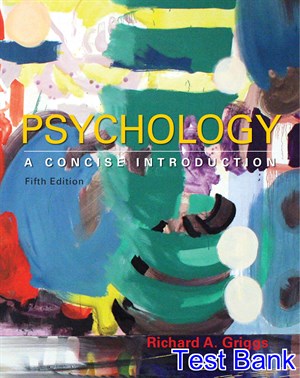This is completed downloadable of Psychology A Concise Introduction 5th Edition Griggs Test Bank

Product Details:
- ISBN-10 : 1464192162
- ISBN-13 : 978-1464192166
- Author: Richard A. Griggs
Providing a rich survey of the field’s fundamental research and concepts at a very affordable price, Psychology: A Concise Introduction covers important topics such as neuroscience, sensation and perception, learning, social psychology, and abnormal psychology while maintaining brevity.
Table of Content:
- CHAPTER 1 The Science of Psychology
- The Four Major Research Perspectives
- Perspectives Emphasizing Internal Factors
- Perspectives Emphasizing External Factors
- Research Methods Used by Psychologists
- Descriptive Methods
- Correlational Studies
- Experimental Research
- How to Understand Research Results
- Descriptive Statistics
- Frequency Distributions
- CHAPTER 2 Neuroscience
- The Neuron
- The Structure of a Neuron
- How Neurons Communicate
- Neurotransmitters, Drugs, and Poisons
- The Nervous System and the Endocrine System
- The Central Nervous System
- The Peripheral Nervous System
- The Endocrine Glandular System
- Emotions and the Autonomic Nervous System
- The Brain
- Going Up the Brain Stem
- Processing in the Cerebral Cortex
- Specializations of the Left and Right Hemispheres
- Consciousness and the Sleeping Brain
- CHAPTER 3 Sensation and Perception
- How the Physical World Relates to the Psychological World
- The Detection Question
- The Difference Question
- The Scaling Question
- How We See and How We Hear
- How the Eye Works
- How We See Color
- How the Ear Works
- How We Distinguish Pitch
- How We Make Sense of What We See
- Bottom-up Processing and Top-down Processing
- Perceptual Organization and Perceptual Constancy
- Depth Perception
- CHAPTER 4 Learning
- Learning Through Classical Conditioning
- The Elements and Procedures of Classical Conditioning
- General Learning Processes in Classical Conditioning
- Learning Through Operant Conditioning
- Learning Through Reinforcement and Punishment
- General Learning Processes in Operant Conditioning
- Partial-Reinforcement Schedules in Operant Conditioning
- Motivation, Behavior, and Reinforcement
- Biological and Cognitive Aspects of Learning
- Biological Preparedness in Learning
- Latent Learning and Observational Learning
- CHAPTER 5 Memory
- Three-Stage Model of Memory
- Sensory Memory
- Short-Term Memory
- Long-Term Memory
- Encoding Information into Memory
- How We Encode Information
- How to Improve Encoding
- Retrieving Information from Memory
- How to Measure Retrieval
- Why We Forget
- The Reconstructive Nature of Retrieval
- CHAPTER 6 Thinking and Intelligence
- Problem Solving
- Blocks to Problem Solving
- Solution Strategies
- Thinking Under Uncertainty
- Judging Probability
- Hypothesis Testing
- Intelligent Thinking
- Intelligence Tests
- Controversies About Intelligence
- CHAPTER 7 Developmental Psychology
- Prenatal Development and Infancy
- Prenatal Development
- How We Develop During Infancy
- How We Think Throughout Our Lives
- How We Learn Language
- Piaget’s Theory of Cognitive Development
- Vygotsky’s Sociocultural Approach to Development
- How Intelligence Changes in Adulthood
- Moral Development and Social Development
- Kohlberg’s Theory of Moral Reasoning
- Attachment and Parenting Styles
- Theory of Mind
- Erikson’s Psychosocial Stage Theory of Development
- CHAPTER 8 Personality Theories and Assessment
- The Psychoanalytic Approach to Personality
- Freudian Classical Psychoanalytic Theory of Personality
- Neo-Freudian Theories of Personality
- The Humanistic Approach and the Social-Cognitive Approach to Personality
- The Humanistic Approach to Personality
- The Social-Cognitive Approach to Personality
- Trait Theories of Personality and Personality Assessment
- Trait Theories of Personality
- Personality Assessment
- CHAPTER 9 Social Psychology
- How Others Influence Our Behavior
- Why We Conform
- Why We Comply
- Why We Obey
- How Groups Influence Us
- How We Think About Our Own and Others’ Behavior
- How We Make Attributions
- How Our Behavior Affects Our Attitudes
- CHAPTER 10 Abnormal Psychology
- The Diagnosis and Classification of Mental Disorders
- The Diagnostic and Statistical Manual of Mental Disorders
- Labeling People with Mental Disorders
- Six Major Categories of Mental Disorders
- Anxiety Disorders
- Obsessive-Compulsive and Related Disorders
- Depressive Disorders
- Bipolar and Related Disorders
- Schizophrenia Spectrum and Other Psychotic Disorders
- Personality Disorders
- The Treatment of Mental Disorders
- Biomedical Therapies
- Psychotherapies
- Glossary
- References
- Name Index
- Subject Index





